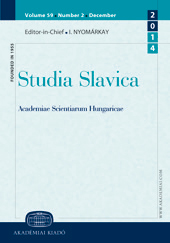Hrvatski jezični atlas – istraživanja u Mađarskoj, posebno zapadnoj (osvrt)
Croatian language atlas - researches in Hungary, especially western region (review)
Author(s): Mijo LončarićSubject(s): Theoretical Linguistics, Phonetics / Phonology, Comparative Linguistics, Finno-Ugrian studies, South Slavic Languages, Philology
Published by: Akadémiai Kiadó
Keywords: Croatian language; linguistic atlas; Western Hungary; dialectology; phonology;
Summary/Abstract: The Croatian language, comprising huge differences considering the number of its speakers, being very important for the reconstruction of a Slavic proto-language (Čakavian accentuation), has become the object of dialectological research early. It has been included in the Slavic Linguistic Atlas (OLA) and in the European Linguistic Atlas (ALE). It was included in the Serbo-Croatian Dialectological Atlas, which was abandoned. In 1996, the Croatian Language Atlas (Hrvatski jezični atlas – HJA) was established by M. Lončarić at the Institute of Croatian Language and Linguistics in Zagreb, with expected 400 research points (in Croatia, Bosnia & Herzegovina and diaspora). The fieldwork was planned to be finished in 6–8 years but the unsufficient funding made the dynamics of the project much slower. Currently, about three-quarters of the expected points have been researched: all the Čakavian ones, while onefifth of the Kajkavian and one-third of the Štokavian ones remain. For the Čakavian points, phonological descriptions have been made, on a model similar to OLA phonological descriptions, and they are currently in print. The paper provides an overview of research in Hungary, especially in its Western part, in particular the results of a recent study of the Štoji dialects.
Journal: Studia Slavica Academiae Scientiarum Hungaricae
- Issue Year: 58/2013
- Issue No: 2
- Page Range: 411-421
- Page Count: 11
- Language: Croatian
- Content File-PDF

